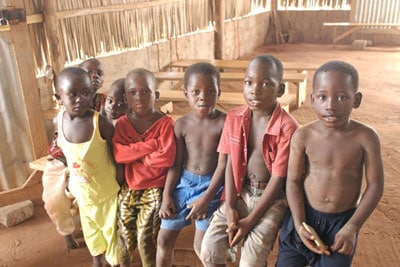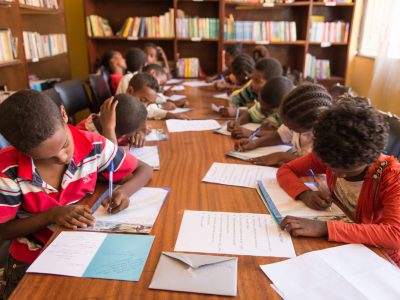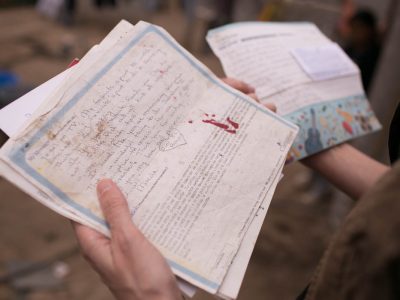The State of the Children
Part two in our four part series – The Case for Compassion Togo
The children of Togo are especially affected by the economic and social issues of the country. The infant mortality rate is nearly 60 deaths per 1,000 live births and the under-five mortality rate is approximately 140 deaths out of 1,000 births. For those who survive those first years of life, there are still numerous difficulties to face.

-
- Education — In addition to the overcrowding and lack of funding for teachers, there are numerous issues that negatively impact the education situation in Togo. According to a UNICEF survey, 5 percent of boys and 2.2 percent of girls who attend primary school will continue on to secondary school. A lack of motivation and financial problems are blamed for this, along with the extreme distance sometimes involved (with some children walking three to four miles one way). Girls are especially affected, with 52 percent of girls in northern Togo having no access to school, largely because they are expected to care for the homes and their younger siblings.
-
- Child Trafficking and Labor — The high rate of poverty in Togo has led to children being traded by their parents for small amounts of money or products such as radios, bicycles or clothing. Parents are promised better living conditions for their children but in reality most live as domestic workers or even prostitutes. Children forced to work as domestic, factory and agricultural laborers often receive no wage at all and those who do might earn between four and ten dollars per month. Those who decide to run away usually end up on the streets, which often leads to prostitution for girls and theft or drug addiction for boys.
- Health — Diseases and health problems such as malaria, typhoid, diarrhea and malnutrition have an especially devastating effect on children. There is little access to hospitals or clinics, especially in rural areas. It is estimated that half of Togo’s population may not have access to potable water. It is also believed that more than 60,000 children in Togo have been orphaned by HIV/AIDS.
TOMORROW: The State of the Church
Photo and story by Phoebe Rogers
Dear Good Samaritans
I am very proud that I am alive so that I can witness and testify to the love of God through Compassion’s ministry in our area.
A Response From YOUR Fan
-
- Do you have a favorite Bible verse or story that has personal meaning to you?
Yes, I do. My favorite Bible verse is Lamentations 3:21-25. And if you read the whole chapter you’ll see why even more.
My favorite Bible story is the story of Joseph, for I can associate with how brothers (and sisters in my case) can disown you or treat you in a way that suggests that you are not part of the family, and how God uses all those bad experiences not only for His glory but also to lift us up and to bless others in the process.
-
- What piece of the Compassion program had the biggest impact on you and your life? (Fellowship with Christians, having access to medical care, meals that were provided, educational opportunities, or something else?)
Gosh, it’s really hard to pick one program that had the most impact because all of them played a major role in my life as I was growing up, but the one that comes to mind was the Thursday Bible study I used to attend when I was 9 years old. It was here that I was exposed to the word of God, which gave me a chance to give my life to Christ (my best decision ever) and equip me with the basic foundation for the Word of God and fellowship with others – something I still treasure to date.
By the way, I can’t forget the meals (which tells you I love to eat … Ha!) coz honestly, this was the only place where most of us children from the slums had the chance to enjoy three meals a day.
And yes, educational opportunities, because I wouldn’t be where I am were it not for the chance to go to school.
-
- Are there things Compassion could do to improve their service to young people and families?

Dear Sponsor: A Letter From Rwanda
“Life has meaning when someone touches it at tender age. Someone stood out and shaped my life. I believe in life of fullness. Thank you my sponsor where ever you are.” – Ruzamba Niyomwungeli

The Journey of One Letter
Have you ever wondered how your sponsored child’s letter gets to you? The long journey it takes from Tanzania or Thailand to Connecticut or California? There’s a lot more to it than you might think!
Samuel Llanes, Guatemala’s Field Communication Specialist, gives us a peek at the journey of one letter from Guatemala to a sponsor in Australia.

Are My Letters Really That Important?
This is a sample of what the children I sponsor write to me. Although the words are different, they often have the same message.
The Reality of Giving – Is Oprah Right?
Forgive me for being somewhat confused. Oprah’s “The Big Give” TV show debuted on Sunday night to huge ratings – 15.6 million viewers – a huge hit for the ABC suits.
The show bases its obvious popularity on the benefits found in giving to the less fortunate, the causes of the broken and down-trodden. The reality of a nation in love with some one else’s reality, are we now minimizing the beauty of giving by watching philanthropy become the latest opportunity/victim to claim fame over?
In the series opener, Oprah meets the ten contestants and gives each an envelope with only the name and picture of a stranger whose lives they must forever change. Each contestant must use the resources awarded to them to drastically improve the life of their assigned person within five days, making the participant cope with the stress by using strategy and creativity.
As a professional whose work is involved in the cultivation of hearts that choose to give, I am torn between rejoicing at this opportunity to promote altruism and frustration that we have somehow made the sacred art of giving the impetus of yet another reality show.
Are we trivializing giving or promoting it? Are we advancing a cause or witnessing the thrill of someone fortunate enough to win their opportunity at personal wealth? I place myself in the homes of countless donors who have sacrificed their time and energy to bless the causes dear to their heart and wonder if somehow we have made their desire to give less impactful and certainly less noble. But why should I even worry?
I am reminded of Paul in his letter to the Philippians who when asked if it was right for others in the jail to promote the cause of Christ said flatly – as long as Christ is preached I rejoice.
By no means am I comparing Paul’s ministry to the modern reality show based on the hope of Oprah, but my confusion becomes more an opportunity to rejoice and reconsider. If my vocation requires me to hold in high esteem the end result of gifts given to benefit others, then shows that promote the same should have my support and not my condemnation. Like Paul demonstrated, I can not be the ultimate jury on someone’s motivation and heart — even if a million dollar prize lies on the other side of their motivation. My professional covenant to honor Christ and enhance relationships to the causes of His kingdom are not license to be critical of another’s rationale for serving, helping and loving.
I think I will reconsider what I view next Sunday. Perhaps less judgemental and suspicious, I will pause to rejoice at what is being said to millions of people who may not have realized that the sacred art of giving comes not in the promotion of self but in loving our neighbor well. In stooping to provide a hand even when the cameras have all been turned off.


